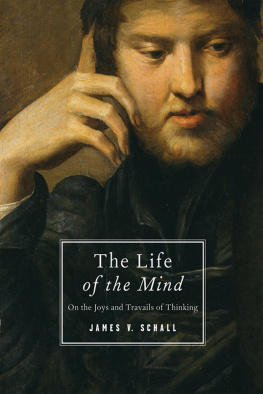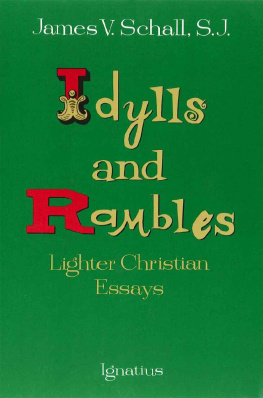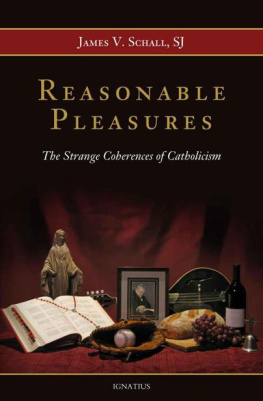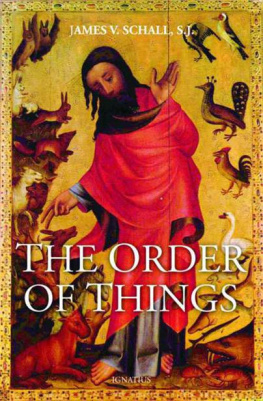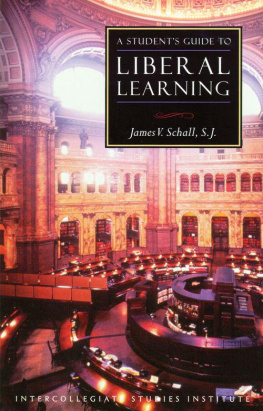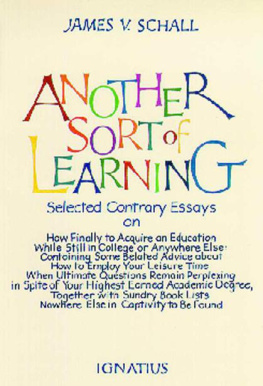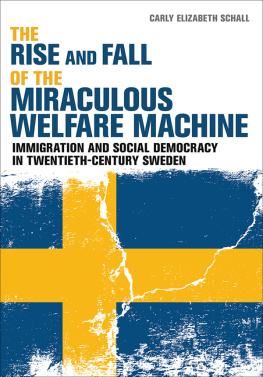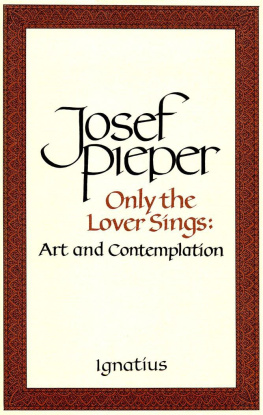On the Unseriousness
of Human Affairs
T EACHING , W RITING , P LAYING ,
B ELIEVING , L ECTURING , P HILOSOPHIZING ,
S INGING , D ANCING

James V. Schall

ACKNOWLEDGMENTS
I WISH TO THANK the following publishers for permission to use materials previously appearing in their journals: The Academy, Chapter 3, Interlude IV; American Benedictine Review, Chapter 1; The American Maritain Association, Chapter 4; Crisis, Interludes III and V; Fellowship of Catholic Scholars Quarterly, Chapter 6; Midwest Chesterton News, Interlude I;Modern Age, Chapter 5; Perspectives in Political Science, Chapter 8;The Shakespearean Rag, Interlude II; Social Justice Review, Chapter 2; Vital Speeches, Chapters 7, 9, and 11.
Another thing to observe when you judge whether a nature is philosophic or not: be sure it has no slavishness in it. Nothing is so inimical as pettiness to a soul that always strives to reach the whole of everything human and divine.
Most true, said Glaucon.
Do you suppose a mind endowed with grandeur and the ability to view all time and all being can think much of the human life?
Impossible.
P LATO , The Republic
It must be borne in mind that no single existing thing is entirely deprived of participation in the Beautiful, for, as the true Word says, all things are very beautiful. Holy Contemplation can therefore be derived from all things.
D IONYSIUS THE A REOPAGITE , The Celestial Hierarchy
Not only does the beauty I beheld
Transcend ourselves, but truly I believe
Its maker only may enjoy it all.
D ANTE , Divine Comedy
We then fell into a disquisition whether there is any beauty independent of utility. The General [Paoli] maintained there was not. Dr. Johnson maintained that there was; and he instanced a coffee-cup which he held in his hand, the painting of which was of no real use, as the cup would hold the coffee equally well if plain; yet the painting was beautiful.
J AMES B OSWELL , Life of Samuel Johnson
Yet some things there are that they [the Ainur] cannot see, neither alone nor taking counsel together; for to none but himself has Ilvatar revealed all that he has in store, and in every age there come forth things that are new and have no foretelling, for they do not proceed from the past.
J. R. R. T OLKIEN , The Silmarillion
Contents
Introduction
M UCH WILL BE FOUND in this book about unexpected things, about gifts and surprises, about things that seem most important but which are held here to be unseriousand unserious is taken to be a compliment. Often in these pages, I will talk about the importance of wasting our time. I will suspect that it is quite possible not to learn much in our universities, at least not much about what is ultimately significant. I want to know what to do when all else is done. To what does our liberal learning point? Merely to ourselves? How rarely do we wonder about these things! Indeed, not to wonder about them is almost the classical definition of what it is to be illiberal.
What must be called the mystery of teaching and learning will often be pondered here. There will be praise for the short essay, so much so that it will help form the structure of the book itself: five short essays, which I call interludes, are included between sundry chapters, partly to state things clearly, partly to change the pace of what is being argued. I am likewise fascinated with the prospect of finding seminal books, even of finding them inadvertently in some library or used bookstore. Almost every chapter contains striking passages that I have chanced to read and have not been able to put aside until I wrote them down. Thus, the structure of this book is leisurely, to some degree conversational. Truth, in fact, can only exist in conversation, to recall an observation of Plato.
But though this books tone is informal, it is about ultimate things and their status among us. We do not much talk about these things, I know. But how ironical, never to consider what is of the highest moment! It is not that our modern preoccupation with politics and economics is a bad thing. Rather, this book points to the fact that these disciplines and realities will not be well-ordered unless we have some sense both of our own order, our self-discipline, and of what is beyond them. What is beyond is something we have largely forgotten or, more likely, rejected. The radical nature of this book, the essence of which is emphasized by the centrality of the word unserious, is the effort to reaffirm the truth of the central tradition of our culture: man is not the highest thing in existence even though his being, as such, is goodand it is good to be. Recognizing this truth does not lessen human dignity but enhances it.
I have placed at the beginning of the book five classic citations that, to me, guide the spirit of what is written here. One is from Plato, one from Dionysius, one from Dante, one from Boswell, and one from Tolkien. I suggest that, before reading anything in this book, the reader take some time to reflect on each of these passages. In effect, they exhort us, remind us about things we must consider if we would be whole. Thus, we seek to know if our nature is philosophic. Do we know our place in reality? Things are connected, including human things. Any thing, if we think deeply enough about it, can lead us to everything. For instance, when we know a beautiful thing, including a beautiful human thing, something worthy in itself, we reach beyond ourselves; indeed, we are called beyond ourselves. We do some things just because they are beautiful. Nor are all things merely repetitions of the past. The new really occurs.
The reader will find many of my friends in this book, both friends that I know and, as I try to suggest in Chapter 5, many whom I have never met, yet know through reading, through having been taught about them I cite these diverse authorities to help me show that the highest things have a certain lightsomeness about them. We sometimes confuse ourselves by thinking that solemn things cannot also be joyful things. But Chesterton once remarked that he did not see why something that is true could not also be funny. There is no reason to separate gaiety from significance. The truth is joyful. The being of things is ultimately rooted in delight, in a delight that we do not make but discover to be already there, to be somehow given to us.
The subtitle of this bookTeaching, Writing, Playing, Believing, Lecturing, Philosophizing, Singing, Dancingwill, at first sight, seem odd. Each word is, of course, intended to point to some aspect of the leisured or unserious life that we are asked to live. Such things exist in our freedom and in our enchantment. Leon Kass, in a remarkable book,
Next page

